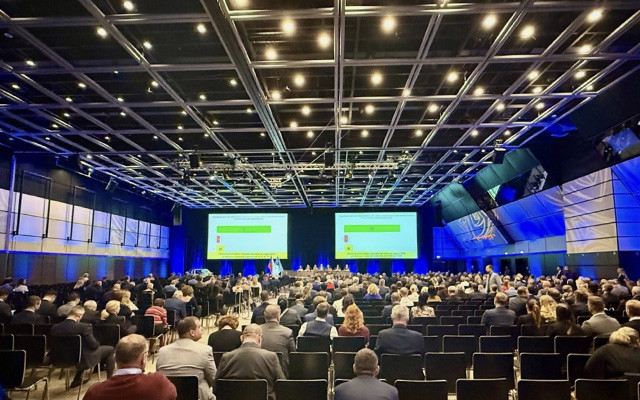
The Czech advocacy has spoken out in defense of the professional independence of its Ukrainian colleagues

The Czech Bar Association (Česká advokátní komora, ČAK) will appeal to Ukrainian President Volodymyr Zelenskyy and Ukrainian authorities to ensure the preservation of the independence of advocacy in Ukraine.
This resolution was adopted by the IX Congress of the Bar Association, which took place on October 3 in Prague, according to the official publication of ČAK Bulletin advokacie No. 10/2025. The draft, which was put forward for discussion by advocate Daniel Hamrad and supported by the delegates of the congress, was a response to the speech by the President of the Ukrainian National Bar Association Lidiya Izovitova, who thanked her Czech colleagues for supporting Ukrainian advocates during the war and outlined three key challenges facing the Ukrainian advocacy today.
The first problem mentioned by the President of the UNBA, BCU, was the mobilization of advocates while performing their professional duties. She drew attention to situations where a summons can be delivered directly in the courtroom or during investigative actions. At the same time, judges, prosecutors, and civil servants in Ukraine are exempt from mobilization under a reservation system. The paradox of the situation is that a trial cannot take place without an advocate, but it is the advocate who can be mobilized at any time. In this regard, the UNBA has repeatedly appealed to parliament and the government, but the problem remains unresolved. According to L. Izovitova, this is not only a matter of fairness towards advocates, but also a direct threat to the realization of citizens' constitutional right to defense.
The second challenge is the identification of advocates with their clients. In Ukraine, defense advocates are increasingly perceived as accomplices of their clients, and the performance of their professional duties is often branded as «anti-state activity». Advocates are forced to choose between patriotism and the protection of human rights — a choice that is inherently flawed, since true patriotism includes respect for human rights. In response, the Verkhovna Rada passed a law that provides for liability for publicly identifying an advocate with their client. Although the law is primarily aimed at protecting human rights by guaranteeing the independence of the legal profession, attempts are being made to prevent the President from signing it, in particular through public criticism from individual journalists and professional civil society activists, rather than the general public. The President of the UNBA, BCU emphasized that this is a moment of truth that demonstrates how deeply rooted the misunderstanding of the role of advocates is in society.
Discussions on the creation of a military advocacy are the third issue. Against the backdrop of the general militarization of Europe, there is discussion of the idea of forming a separate state structure in Ukraine that would operate in parallel with the independent advocacy. However, a fundamental question arises: can someone who receives a salary from the state and at the same time has to defend a person — precisely from the actions of that state — really be independent? According to L. Izovitova, effective protection of the rights of military personnel is only possible through an independent advocacy, since a state structure is not capable of ensuring a sufficient level of objectivity and public trust. This issue goes beyond Ukraine, as similar initiatives can also be implemented in European Union countries. Thus, if the relevant decision is adopted, Ukraine may set a precedent: either the balance between national security and the principles of the rule of law will be preserved, or these principles will be sacrificed for the sake of administrative convenience.
At the end of her speech, L. Izovitova presented the President of the ČAK Robert Němec with an honorary award from the UNBA as a sign of deep gratitude to Czech colleagues for their support of Ukrainian advocates in wartime. In response, Robert Němec expressed his gratitude to all Czech advocates for their solidarity, courage, and friendly attitude towards Ukraine, emphasizing that this award is a recognition that belongs to the entire legal community of the Czech Republic.
It should be noted that advocates from the Czech Republic were the first to extend a helping hand to their Ukrainian colleagues. They not only provided financial support to affected advocates in the form of donations, but also allocated funds to the Red Cross, demonstrating sincere concern and a deep understanding of the situation. Therefore, the gratitude expressed at the international level was well deserved — Czech advocates proved their principled position and genuine solidarity with the Ukrainian advocacy.
© 2025 Unba.org.ua Всі права захищені
"Національна Асоціація Адвокатів України". Передрук та інше використання матеріалів, що розміщені на даному веб-сайті дозволяється за умови посилання на джерело. Інтернет-видання та засоби масової інформації можуть використовувати матеріали сайту, розміщувати відео з офіційного веб-сайту Національної Асоціації Адвокатів України на власних веб-сторінках, за умови гіперпосилання на офіційний веб-сайт Національної Асоціації Адвокатів України. Заборонено передрук та використання матеріалів, у яких міститься посилання на інші інтернет-видання та засоби масової інформації. Матеріали позначені міткою "Реклама", публікуються на правах реклами.